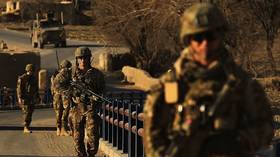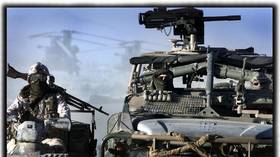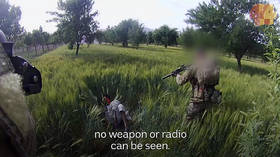The first Australian soldier has been charged over Afghanistan war crimes, but those ultimately responsible remain in command
The murder allegation could be the start of a lengthy string of trials, which is unlikely to ever reach the top brass

Earlier this week, an Australian soldier, Oliver Schulz, 41, was charged with murder by the Australian Federal Police in relation to the killing of a civilian in Afghanistan in 2012.
Schulz was remanded in custody and is due to appear in court again on May 16. His trial will probably commence later this year, and, if found guilty of murder, he faces a maximum sentence of life imprisonment.
Schulz was a member of the elite Special Air Service (SAS) Regiment – Australia’s shock troops that did most of the fighting in Afghanistan. He served multiple tours of duty, and was awarded the Commendation for Gallantry.
This is the first criminal prosecution brought as a result of investigations conducted by the Office of the Special Investigator (OSI) – a body established in 2021 by the Australian government to determine if criminal charges should be brought in respect of possible war crimes that had been identified in the 2020 Brereton Report.
The Brereton inquiry found “credible evidence” that Australian soldiers may have murdered some 39 Afghan civilians and prisoners between 2005 and 2016. Investigation head Paul Brereton recommended that any prosecutions for these crimes be brought in the civil courts, rather than before military tribunals, leading to the charging of Schulz this week.
The Brereton inquiry was established in response to reports by the ABC and Channel Nine alleging that Australian soldiers had committed numerous war crimes during the Afghanistan war.
Media reports accused Victoria Cross winner and SAS war hero Ben Roberts-Smith of having committed atrocities while on duty, prompting him to commence defamation proceedings against the publishers. The lengthy Roberts-Smith hearing was delayed by Covid-19 and only concluded last year, with the judge expected to hand down his judgment later this year.
At the trial, the defendants, who are publishers raising a defense of truth, called evidence from a number of Afghan civilians and SAS soldiers. If believed, it would prove that Roberts-Smith had, in fact, committed various atrocities – including murder. It is not known whether OSI is currently investigating Roberts-Smith, but if the publishers’ truth defense succeeds, Roberts-Smith will almost certainly be prosecuted.
Schulz is believed to have been featured in an ABC Four Corners documentary – although he was not named – that showed footage of an Afghan civilian, who was lying down in a field with his hands raised, being shot by an Australian SAS soldier. That soldier is now alleged to be Schulz.
The Schulz prosecution is just the beginning of what will be a lengthy and embarrassing process for the Australian Defence Force (ADF). The OSI is currently investigating between 40 and 50 additional war crimes allegedly committed by Australian soldiers in Afghanistan.
Fiona Nelson, director of the Australian Centre for International Justice, said this week that, “Victims of human rights violations across the conflict in Afghanistan have for decades been denied avenues for any accountability. Criminal proceedings in Australia have an important role to play in finally allowing for impunity to be challenged. Australia has a lot of work ahead to respond to the legacy of its military engagement in Afghanistan.”
Australia’s involvement in the war in Afghanistan – in support of the US attempt to impose a form of democracy and regime change on the Asian country – has already proven to be a grave embarrassment for Canberra. Schulz’s trial, and the others that seem certain to follow in its wake, will no doubt add to Australia’s disgrace and shame.
Some 26,000 Australian personnel were deployed in Afghanistan. 41 soldiers died and 261 were wounded. The war in Afghanistan resulted in a comprehensive military disaster for the invaders with the US and Australia forced to make a humiliating withdrawal in the face of the resurgent Taliban’s return to power.
The military loss in Afghanistan and the findings contained in the Brereton Report have completely destroyed the reputation and morale of the ADF, and the Schulz prosecution, whatever the outcome, can only add to the ADF’s woes. This was confirmed by SAS Association Chairman Martin Hamilton-Smith, who said this week that Schulz “has a right to put his version of events and to explain the nature and complexities of the fighting in Afghanistan.”
When the Brereton findings were handed down in November 2020, the ADF top brass refused to take any responsibility whatsoever for the conduct of Australian troops in Afghanistan.
Military leaders heaped blame on low-ranking SAS soldiers and appeared surprised at Brereton’s findings. An entire SAS Regiment was disbanded, and medals awarded to thousands of ordinary soldiers were peremptorily rescinded. Was the military leadership really completely unaware of how the war in Afghanistan had been fought, or, as is much more likely, had the ADF top brass simply turned a blind eye to events happening in Afghanistan for years?
Additionally, the military elite’s enthusiastic support for Schulz’s prosecution should not blind us to the fact that this may well be just another ploy to avoid taking ultimate responsibility for the war crimes undoubtedly committed by Australian troops in Afghanistan.
However, the ADF leadership’s dereliction of duty does not stop there. It was the ADF top brass that encouraged and permitted soldiers to engage in multiple tours of duty in Afghanistan as a matter of course – surely an unwise policy, and one that could likely lead to the brutalization of ordinary soldiers.
Also, it was the same top brass that drafted the inappropriate terms of engagement that governed the conduct of Australian troops in Afghanistan – rules that some defense experts and soldiers feel caused, at least in part, the excesses revealed by Brereton.
It was the same military leadership that failed to properly support those soldiers who returned from Afghanistan in a traumatized state. After all, it became clear very early on in the war that many soldiers who returned home were unable to readjust to civilian life. Suicide rates amongst returning veterans were extraordinarily high, but the ADF top brass did little or nothing to assist these shattered individuals.
Only when veterans’ organizations engaged in media campaigns to highlight the issue did the federal government belatedly act. In July 2021 a Royal Commission was established to enquire into veteran suicide. The Commission is yet to hand down its final report.
As a result of Australia’s involvement in America’s misguided war in Afghanistan, the ADF is now a broken organization. Its morale is shattered and veteran’s organizations and many ordinary soldiers have lost all respect for the ADF leadership.
Nevertheless, the very same military leaders that presided over the Afghanistan war, and all that has transpired subsequently, still remain firmly in charge of the ADF. It is proper for ordinary soldiers like Oliver Schulz to be prosecuted for war crimes, but it should include those who bear ultimate responsibility for what occurred in Afghanistan – namely the upper echelon ADF officers and politicians who uncritically supported the United States invasion and its aftermath – and they should be held accountable and punished.
Of course, that will not happen because – as last week’s AUKUS deal clearly demonstrated – the obvious lessons that should have been learned from Australia’s disastrous involvement in the Afghanistan and Iraq wars are still being ignored by the political and military elites that continue to rule Australia in their characteristically inept fashion.
The statements, views and opinions expressed in this column are solely those of the author and do not necessarily represent those of RT.
https://www.rt.com/news/573516-australian-soldier-afghanistan-war-crimes/



0 Comments:
Post a Comment
Subscribe to Post Comments [Atom]
<< Home